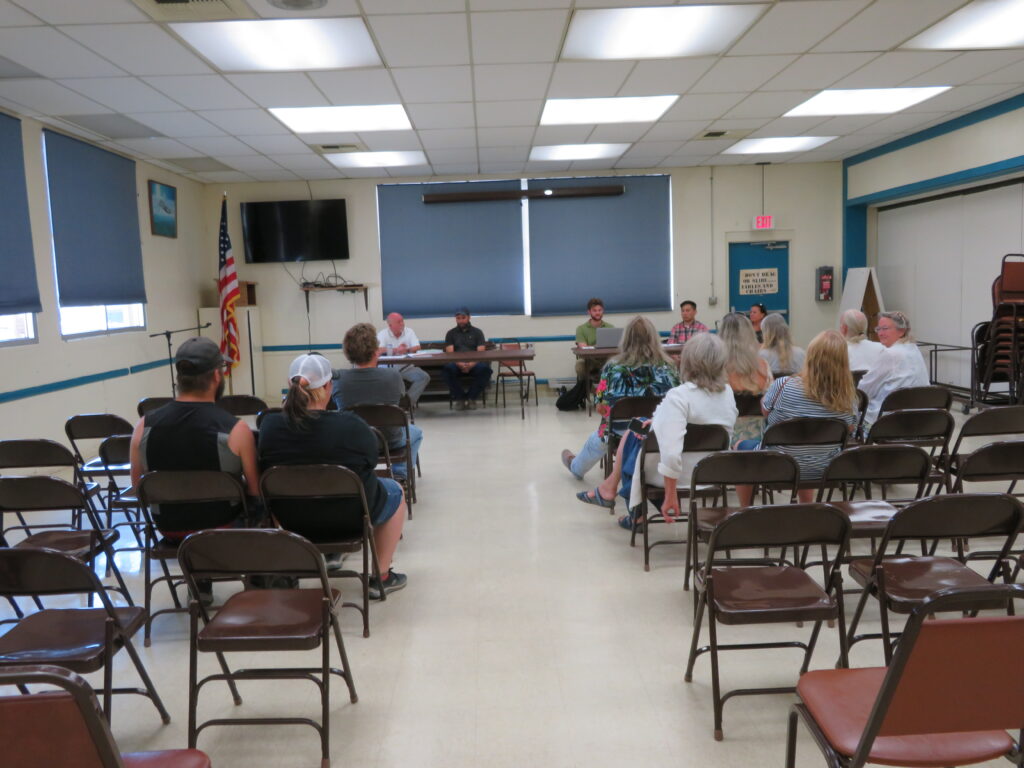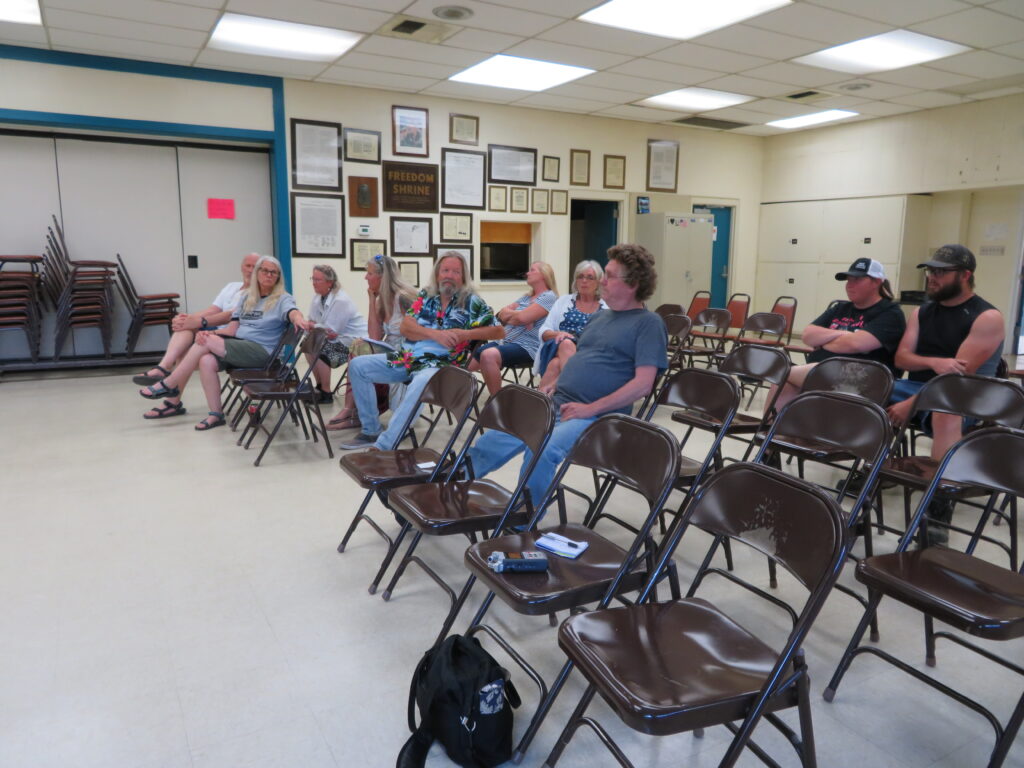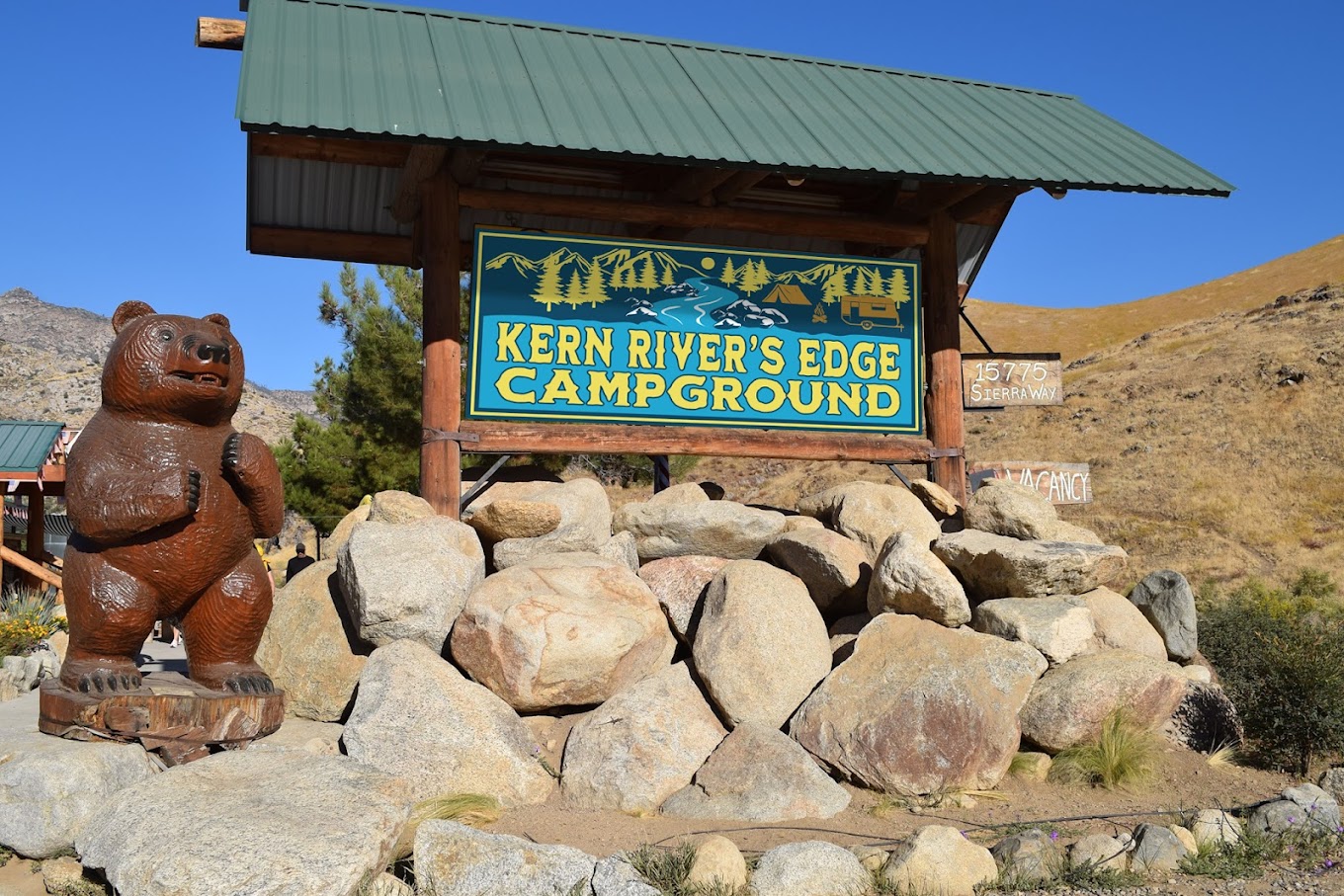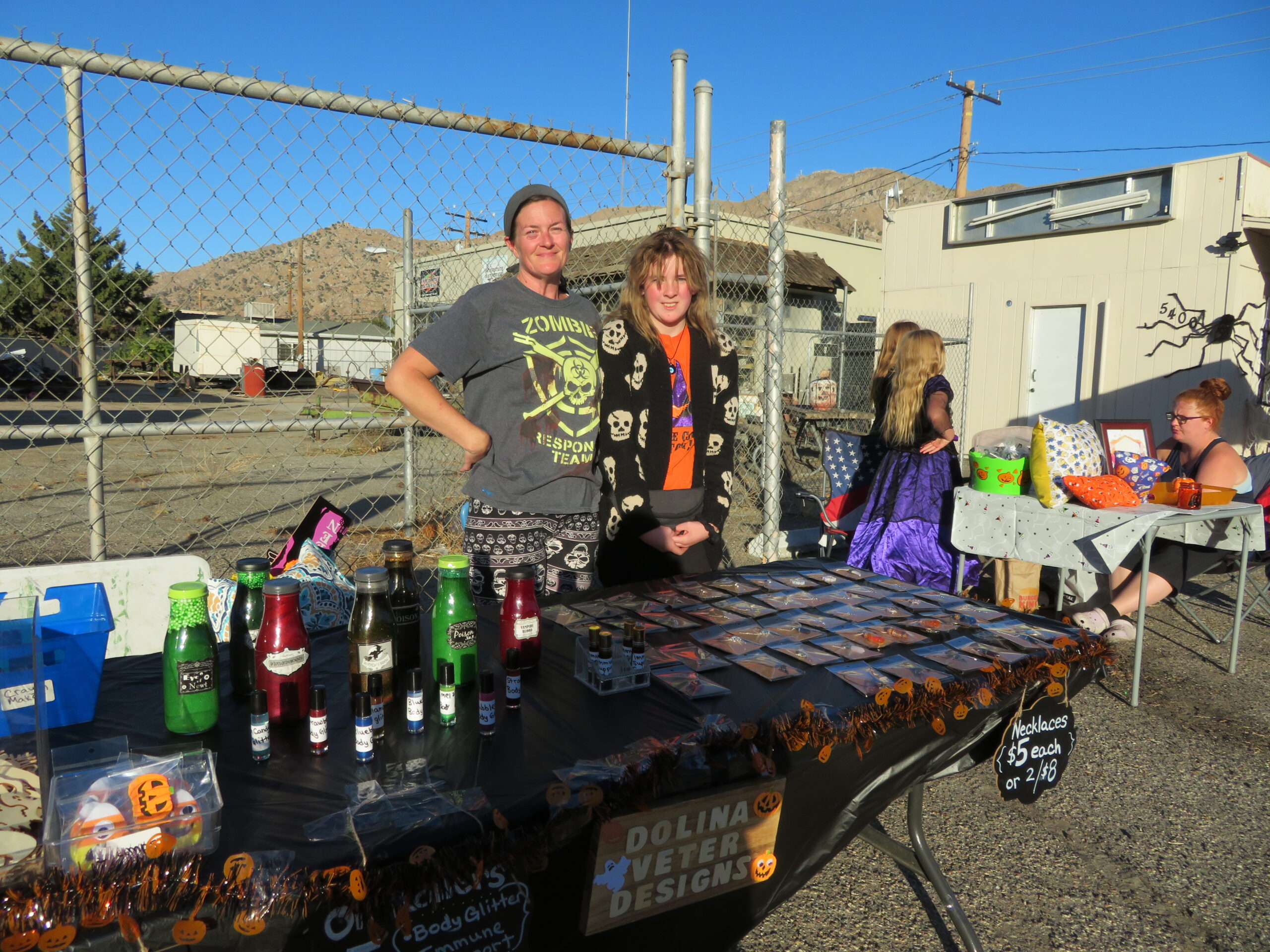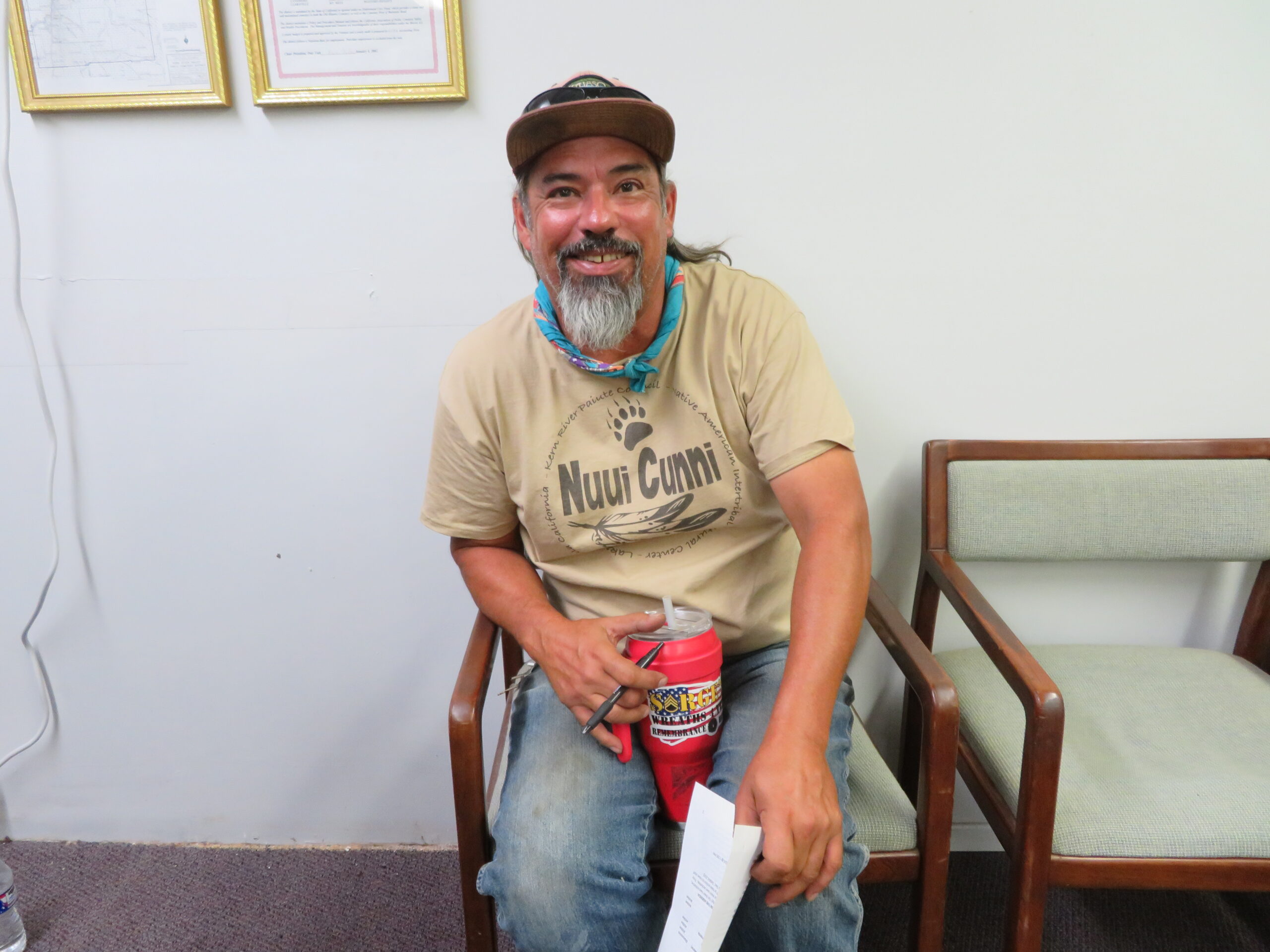Utilities engineers for the California Utilities Commission, Josh Silberstein and Evan Chang
Photos and story by Catherine Stachowiak
The California Utilities Commission held a public meeting, at the Kern River Valley Veterans Center, Thursday June 27, for the public to comment on a raise in water rates to Erskine Creek Water Company customers.
Two utilities engineers for the California Utilities Commission, Josh Silberstein and Evan Chang gave an overview regarding the process for determining water rates going forward.
Silberstein said, “The basic information is there’s the rate increase that we have for a general rate case. Both of us are utilities engineers, in the small water section, with the water division. And we oversee privately owned water systems with less than 10,000 connections.”
Silberstein told the group of about 10 to 15 customers, at the meeting, that when regulated utilities need to make changes to their tariffs, they file advice letters. And those are designated from tiers one through three. A general rate case is a tier three, which is one of the more complex processes through the commission. And when a small utility seeks a larger case, typically to only account for inflation, there’s a consumer price index increase. And a general rate case is filed with eventually a resolution.
He said, “What everyone has had a chance to put their opinions in, so far, is a proposed increase. And the actual recommended increase will again have another protest period for customers like yourselves to send your opinions out when the proposed resolution is sent out by the commission. Staff like ourselves issues our recommendation, for the outcome of the general rate case, by drafting that proposed resolution. And this resolution may recommend all, none, or a fraction of the proposed rate increase.”
Silberstein assured the public that, as of the meeting, nothing about the potential rate increase had been completely determined. And the proposed resolution would be placed on a voting meeting agenda, where the commissioners would vote to approve, or reject that resolution.
From that meeting forward there would be several ways for the public to get involved and be heard by the commission. The commission and water company gave that public a 20-day comment period, when the public notice was sent out, and the public received instructions on how to submit a protest. During the meeting the commission was taking into consideration the comments, from the public, when making their determination.
The CPA consultant who helped prepare the paperwork for Erskine Creek Water Company going into process of filing, Christian Aldinger said, “I’m here on the company’s behalf. Everybody’s water bill is made up of two parts, the service charge based on meter size, and the quantity charge, based on how much water you use.”
Erskine Creek serves 1131 customers, 93% of which they serve using smaller meters. Aldinger determines revenue requirements, costs of operation and replacements, and upgrades based on historical accounting information.
Aldinger said the company’s revenue requirements are $1,430,000. Under present rates the company would only recover $1,041,000. Between the years 2018 and 2023 Erskine Creek Water Company put an amount of $758,000 into the system, tanks, lines and various improvements. However the last general rate case was an adjustment in 2018.
From this point forward the utilities commission would make its recommendation, based on the facts, and input from customers.
One customer complained he’s paying for bottled water, and a water filter, saying he did not prefer to drink Eskine Creek Water Company water because of the hard water deposits.
Justin Slinkard, employee of Erskine Creek Water Company said, “Where we’re at is very hard water. And we have a lot of magnesium in our water, and there’s nothing we can really do about it, because it comes from the rocks.” Slinkard told the group that the magnesium is considered to be good for the system because it coats the pipes but is not bad for human consumption. The company removes what the state regulates them to take from the water, and tests the water, 20 samples per month. Company employees at the meeting said that their parts alone are 300% of previous costs.
Another customer asked the company to be reasonable about what it’s charging, and to charge only a reasonable increase.
Chang assured the public that the recommendation from the commission would take into consideration the fixed income situation of the community.
Another customer said she thought the amount was fair, yet she talked to her neighbors, and some were struggling. One neighbor was nearly in tears about her increased costs. She thought they should implement the increase in phases rather than all at one time.
Another customer said her family was longtime customers. She felt the company was operating without being open to the public. And a retirement community would have trouble paying the proposed rates, which would make customers struggle more than they have been. She said her property was flooded out, to flush out the system of Erskine Creek Water Company, at one point. She was frustrated with the lack of transparency and wanted to see the company give a better breakdown of the rates and proposed increases so the customers had a better understanding of the charges.
Debbie Loseth, office manager of the water company said that a lot of water company offices were closed, but Erskine Creek Water Company’s office has been open. If customers call, and make an appointment, the customer can come in and talk with company staff.
One customer suggested the idea of the company writing a grant. The company has attempted to do so, but grants are for facilities and for building things like pipelines and tanks. Companies cannot attain grants unless the vicinity is in a disaster state.
Loseth said, “we really care about this community. We really do.”
One customer complained that the letter of warning about rate hikes was dated June 4, but customers never received the letter until June 12 and they only had until the June 24 to respond.
The initial notice was sent out in the customer bills in February, and according to Loseth, it was the United States Postal Service, which took that long to deliver the June notice and was not the fault of the water company.
One customer asked if the increase was based on income of the area and ability to pay.
However Erskine Creek Water Company serves a smaller area, and therefore does not have a program to assist low-income customers. Loseth pointed out that she would be retiring next year, but said that the company is compassionate toward customers having trouble paying their bills and was always willing to work with customers.
